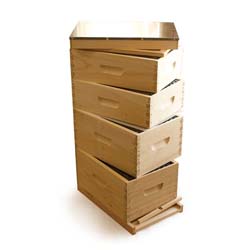Introducing John Williams…
John is a Colony member from Texas, going into his fifth year of natural beekeeping. Referred to by friends as something of a renaissance man, John got his start in beekeeping by observing a beekeepers home that he drove by everyday. He thought to himself “If they can raise bees, so can I” – and the rest is history.
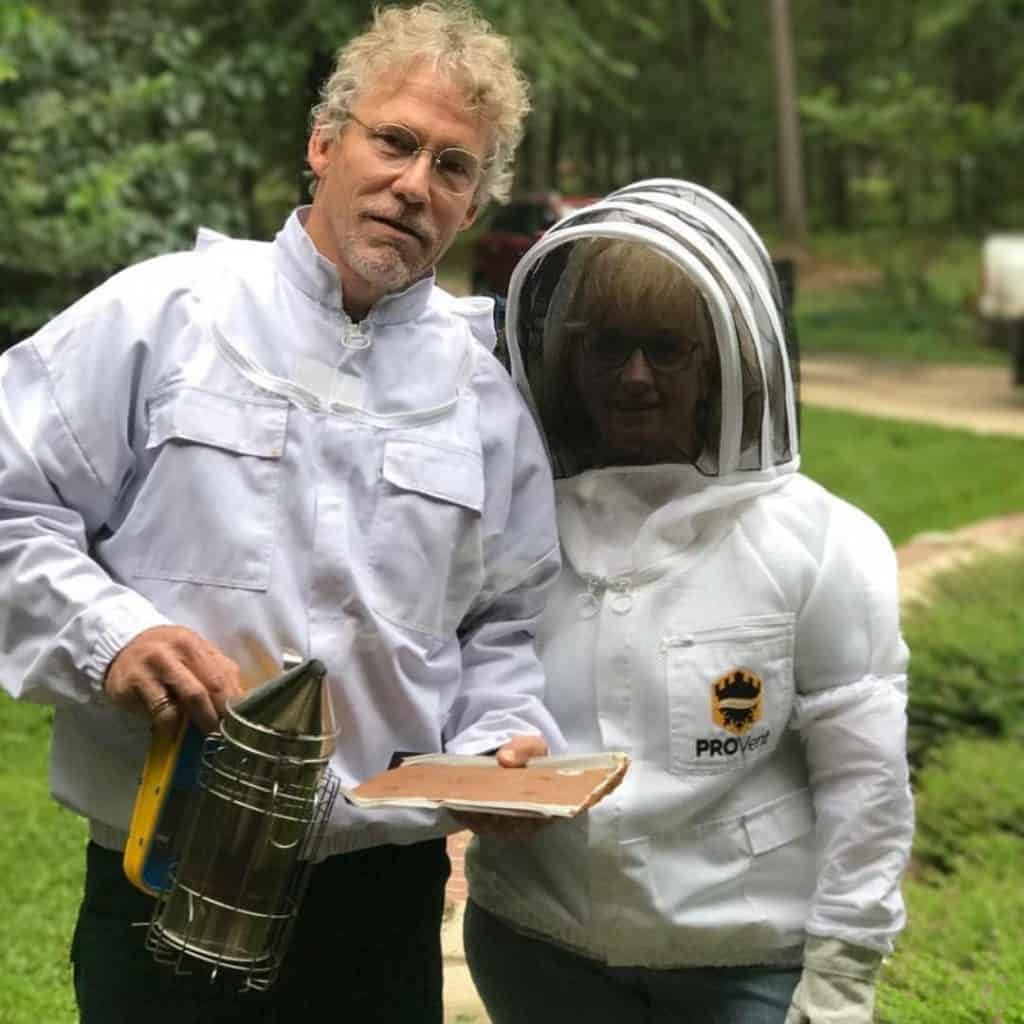
What started as a hobby of beekeeping turned into making usable products from the riches produced by his bees. He is environmentally conscious and takes care to make the most of all the bees have to offer.
John is an adventurous bee herder, enjoying the challenge of rescuing hives from apartments and homes, where others may have called an exterminator. He currently has six healthy hives!
PerfectBee: What inspired you to start beekeeping?
John: All my life I have always found something to get into. Always having a project to do. My personality is very much “fear nothing – conquer your dreams”.
My interest in bees started while on my daily drive to and from work. I would pass this house that had a garden and varying numbers of bee hives. Sometimes there would be as many as ten hives, some big boxes and some small, and all were colorfully painted.
Little did I know then that those were ten deeps and mediums along with a few nucs. I thought that if these people could raise bees than so could I, and thus began my journey into discovering everything I could regarding bees.
Are you a member of a beekeeping club?
We do have the Pineywoods Beekeeper Association of Angelina County but due to my work schedule I have been unable to attend any of the meetings.
Since the onset of COVID the meetings have been suspended and the Zoom meetings did not work well, with a lack of participation.
Due to the lack of a local community at the moment, have you found any online communities or groups to interact with that have been helpful for you?
I have found the PerfectBee Forum and Colony to be a great concept. Mark, Ron, Joe, Kate, William, Judy and Pam are the PerfectBee Ambassadors and they have been very helpful in the forum.
Do you share your beekeeping with anyone else (friends, family, co-workers), aside from the PerfectBee community?
I have a niece, Lizzie, who I have been helping with saving and straightening out six abandoned hives that are on some property that she bought.
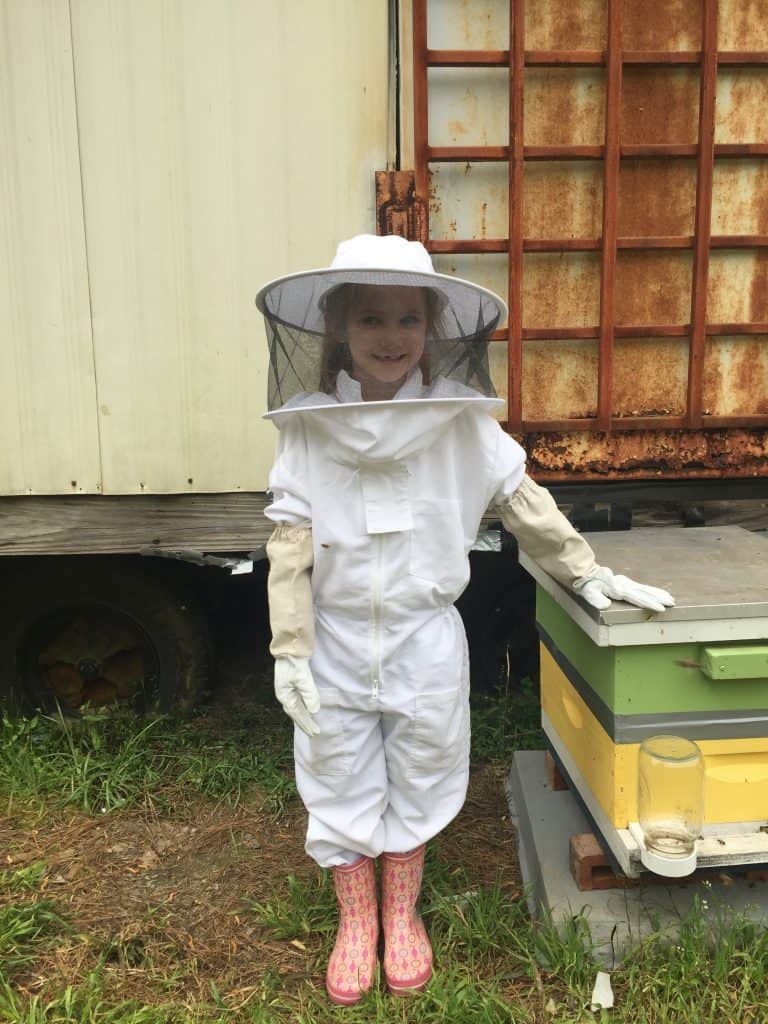
I have also gotten my wife interested in beekeeping, along with my seven-year-old granddaughter. I enjoy rescuing hives with them too.
But, to answer your question, I share information on bees with basically anyone I can get to listen to me!
How is the hive rescuing with your niece going? Does she intend to keep them and start beekeeping, or will you perhaps be taking them on?
Lizzie is still maintaining her hives on her property, has applied for an agricultural exemption, and we to talk about her bees from time to time
This year is the first year she will be harvesting her “sweet gold”. If at any time she is unable to continue with her hives I would gladly take them over for her.
What are your main objectives and goals with beekeeping?
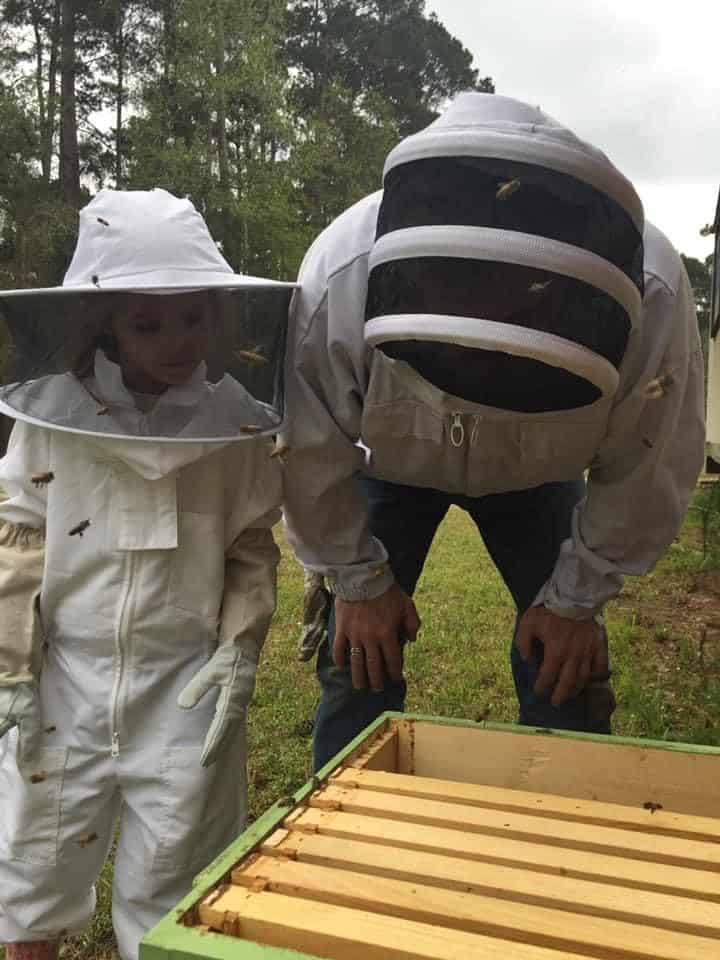
This all started out as a hobby for me. I wanted to learn about bees, raise them, and harvest honey in the most natural way possible. No chemicals.
I have expanded my interest into making candles, calendula salve, tincture with propolis, lip balms, and of course I enjoy all the free honey.
Besides the obvious benefits of natural beekeeping, what do you find are the pros and cons? How are you handling varroa mites and other pests that are sometimes dealt with using chemicals?
Bees have been around since the beginning and have survived through the centuries, without the assistance of humans. Our interference has probably harmed bees more than anything else has. If there is a way to keep man-made chemicals away from the bees, so that they remain healthier and produce chemical-free honey, I will do it.
Natural beekeeping has many pros. Bees are the pollinators of nature, they can help with allergies, we can use their wax for many products, and of course consume their delicious honey. The cons of not using man-made chemicals might be a higher loss of bees due to varroa mites, hive beetles, and wax moths.
Currently I am taking mite counts via a sugar dusting method. I’m spinning pure cane sugar and making my own powdered sugar, so that it will be free of corn starch and other additives.
I do this because it really bothers me to kill 300 bees with an alcohol wash in order to get a mite count. That may seem silly to some, but I hate losing bees for any reason.
I use Hop Guard, a natural food grade varroa mite treatment, to keep them in control.
How was the learning curve in making candles, salves, balms, etc.? Have you been selling these or just making them for personal use?
Candle making was not all that difficult to learn. I learned quickly not to overcook the wax, and that not all bee wax is suitable for candles.
In June of 2019 I was removing a hive from a fireplace chimney, ending up with 6 five-and-a-half foot sections of beehive. The comb was blackish brown and smelled of soot but, since I am so conscious about not wasting anything, I thought I would just make a whole bunch of candles with this wax.
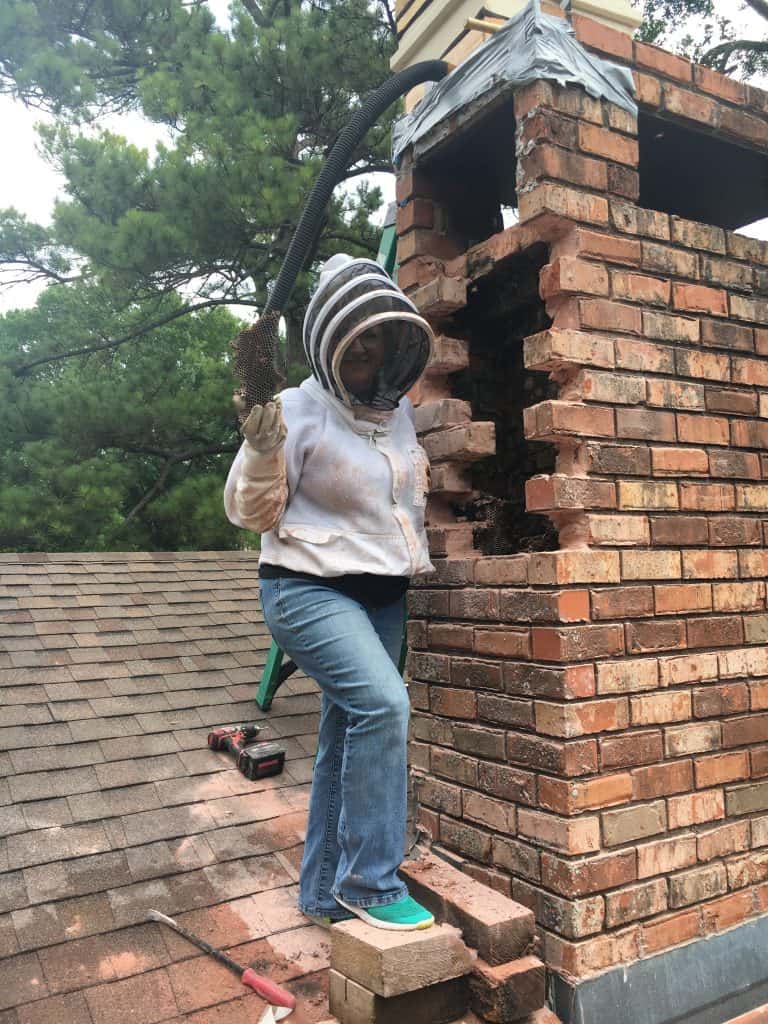
After melting this comb down and pouring it into molds I had a batch of candles that smelled like smoke. Most people don’t enjoy the smell of a sooty candle. Lesson learned!
The lip balms were easy to make but the salves were a different story. I had two types of salves that I made, my favorite being calendula salve. In these I put olive oil, dried calendula petals, coconut oil, lavender, and tea tree essential oils. It makes a beautiful, pale orangey-yellow color that I pour into two-ounce tins.
My wife wanted a salve that was creamier in texture so I whipped a small amount of water into the mixture. This turned the mixture a pale green color, felt really nice, went on the skin and penetrated well.
The part I missed was the preservatives. If you add water without preservatives this salve will grow some wicked looking mold! Needless to say, nobody in my family dared using that one again.
What is your biggest concern or worry about your bees or beekeeping?
My biggest concern about beekeeping is the loss of a hive. I don’t want to do harm to any hive, but trying to figure out what went wrong can be hard sometimes.
Hive losses are an inevitability when beekeeping, but have you found ways to reduce hive loss in your years of experience?
Everyone will suffer hive losses at some point in time. Whether it is a weak versus strong hive, effects of weather, queenright or queenless, or perhaps inspecting and opening up the hives too much. The key is to try and understand what is and what has happened, and to not be afraid to ask questions. Use the PerfectBee forums for this!
I have lost package hives several times after their first year and I believe it was the result of varroa mites. Most of my feral hives are really strong and my only losses this year have been due to the cold (3 degrees), and perhaps that they were trapped too late in the year.
I have also learned that by trapping bees, one does not always get the queen. She is a hard bugger to catch! I have had great success in ordering queens and placing them into the feral hives. I have even gone back to trees from the previous year where the queen had not been captured and collected bees again. It sure is fun!
What is or was your biggest surprise in beekeeping?
My friend called me on April 3rd last year and said there was a huge hive in a tree out in front of his office downtown. It was about three-and-a-half feet long and hanging on a tree limb 10 feet off the ground.
My wife and I were still green with hive capturing and I was at work, unable to help her with it. I explained to her that all she needed to do was shake them off the limb into a box and bring them home.
Now my wife does not like ladders, her box is not nearly big enough, and it’s starting to get dark. She calls me in a panic because she is unsure what to do. I didn’t have any boxes large enough at work, but I did have a very large plastic bag. She grabbed the bag, went back to the hive, loaded them up, and headed home.
I get another phone call as soon as she gets home. “How do I set up the hive? How do I get them out of the bag?” I walked her through it and my wife did an absolutely amazing job.
It turned out to be about 15 pounds of bees, completely filling two deeps and 1 medium. I called it the Moore Hive and it is a strong one. My wife is a wonderful woman and she really surprised me with this capture.
Do you still have the Moore Hive? How are they doing now, a year later?
I do still have the hive and it has wintered well. This will be one of the hives that I will try and split this year. I plan on doing a Doolittle Split since I still have difficulty finding unmarked queens.
What would you say was the most intense, or largest rescue of bees that you did? How did you manage it, and do you always keep them?
All my rescue hives have been unique in their own way. The most intense rescue was in April of 2019, in a mobile home-style trailer that was used for storage. The hive was located underneath the trailer and the clearance was, at best, maybe 24 inches. My wife and I had to slide under the trailer on our backs, leaving ten inches between our chests and the hive.
What an eerie feeling this was, facing a bee hive that spans six feet back and four floor joists in width. Face to face with thousands of bees and no way to get out quickly. I can’t remember how many times we got stung, but it was a bunch.
This was my first rescue hive and my first time using a homemade bee vacuum that I made. It worked, but I greatly miscalculated how many bees I could stuff into a deep. It ended up taking us two full days to collect all of those bees.
We were newbies and so proud of our stings, only to have the hive abscond months later.
What do you enjoy the most about your time beekeeping?
I just love to watch the bees do their thing. It’s fascinating. Where beekeeping is concerned, I just wish I knew I was doing it right one hundred percent of the time, and I wish I had a one-on-one mentor to teach me. I read, research, and learn from my mistakes but I hate the cost that comes with those mistakes.
